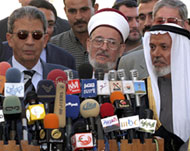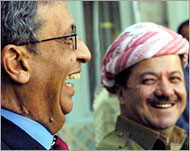Iraq cleric backs reconciliation meeting
A push by the Cairo-based Arab League to gather Iraq’s divided factions for a national reconciliation conference has gained momentum, after Iraq’s top Shia cleric gave his blessing to the initiative.

Grand Ayat Allah Ali al-Sistani, whose views are influential among Iraq‘s Shia, told Amr Moussa, the head of the 22-state Arab League, that he supported the idea of a conference in Cairo next month, Moussa said on Saturday.
“He gave his blessing to the conference,” Moussa told reporters in Najaf after meeting al-Sistani there.
Al-Sistani rarely speaks publicly and his office did not immediately confirm the content of their discussions.
Moussa, secretary-general of the league, has held a flurry of talks with Iraqi leaders in recent days in an effort to ease sectarian tensions that have risen since January elections swept Shia and Kurds to power, and isolated Arab Sunnis once dominant under Saddam Hussein.
Sunni participation
On Friday, some leading Arab Sunni leaders said they too had agreed to take part in the conference, to be held in the Egyptian capital on 15 November.
Sunnis are seen as the driving force behind Iraq‘s two-year-old anti-government uprising.
 |
|
Moussa (L) held talks in Iraq to |
Saleh Mutlaq, seen as one of the more moderate Sunni leaders, said on Friday that about 80 Iraqi politicians were expected to participate in the talks that will be attended by Arab foreign ministers.
He said the possibility of holding a follow-up conference in Baghdad had also been raised. However, it is unclear what influence the Sunni leaders really have over the more extreme or hardcore elements of the uprising.
Demands made by some groups ahead of the conference show that reconciliation is going to be difficult to achieve.
Conditions for talks
Iraq‘s influential Association of Muslim Scholars set several conditions for joining the talks, including a timetable for the withdrawal of US troops and allowing the return of Iraqi army officers dismissed by the former occupation power.
The Sunni clerics also said they wanted an investigation into “crimes committed by elements of the security forces and others”, repeating an allegation that the government sanctions hit squads operated by Shia fighters. The government denies the accusations.
Kurdish dialogue
Later on Saturday, Moussa flew to the Kurdish city of Arbil in northern Iraq for a historic visit to the autonomous region, saying he had always been close to Kurds.
 |
|
Kurdish leader Barzani (R) |
Moussa’s visit marked the recognition of Kurdish autonomy on the territory of a member country.
“We have always understood the Kurdish people’s ambitions,” Moussa said.
Kurdish journalists pressed him on the league’s position towards regional autonomy that has been inscribed in the draft Iraqi constitution that was put to a referendum on 15 October and appeared close to approval.
League criticised
The Arab League has been criticised for not condemning persecution of Iraqi Kurds and Shia under the government of Saddam Hussein, and for being slow in helping the country rebuild after the US-led invasion in March 2003.
But Moussa reminded Kurds that he had received their regional president, Massoud Barzani, amid such criticism in 2002, before Saddam was toppled from power.
“I have never been removed from the Kurdish people,” he said in Arbil, which he called the capital of Kurdistan, and where he had come to pitch the national reconciliation conference.
The Arab League chief was to stay the night among the Kurds and attend a session of their regional parliament on Sunday in a gesture filled with symbolism.
Iran visit
According to Aljazeera, Moussa has said he will also visit Iran at the invitation of the Iranian President Mahmoud Ahmadinejad.
The Arab League is also held in some suspicion by Iraq‘s Shia leaders since most of the member countries are led by Sunnis, who are globally the predominant Muslim sect.